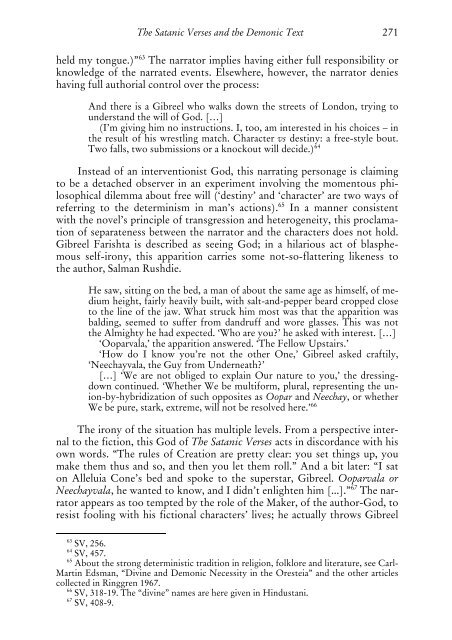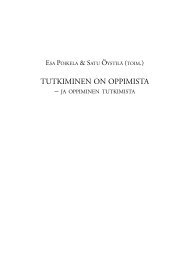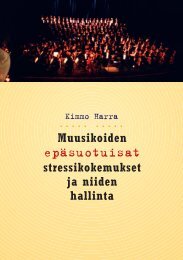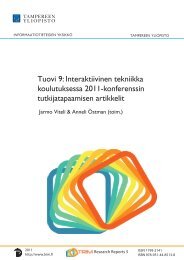Note on this edition: this is an electronic version of the 1999 book ...
Note on this edition: this is an electronic version of the 1999 book ...
Note on this edition: this is an electronic version of the 1999 book ...
You also want an ePaper? Increase the reach of your titles
YUMPU automatically turns print PDFs into web optimized ePapers that Google loves.
The Sat<strong>an</strong>ic Verses <strong>an</strong>d <strong>the</strong> Dem<strong>on</strong>ic Text 271held my t<strong>on</strong>gue.)” 63 The narrator implies having ei<strong>the</strong>r full resp<strong>on</strong>sibility orknowledge <strong>of</strong> <strong>the</strong> narrated events. Elsewhere, however, <strong>the</strong> narrator denieshaving full authorial c<strong>on</strong>trol over <strong>the</strong> process:And <strong>the</strong>re <strong>is</strong> a Gibreel who walks down <strong>the</strong> streets <strong>of</strong> L<strong>on</strong>d<strong>on</strong>, trying tounderst<strong>an</strong>d <strong>the</strong> will <strong>of</strong> God. […](I’m giving him no instructi<strong>on</strong>s. I, too, am interested in h<strong>is</strong> choices – in<strong>the</strong> result <strong>of</strong> h<strong>is</strong> wrestling match. Character vs destiny: a free-style bout.Two falls, two subm<strong>is</strong>si<strong>on</strong>s or a knockout will decide.) 64Instead <strong>of</strong> <strong>an</strong> interventi<strong>on</strong><strong>is</strong>t God, <strong>th<strong>is</strong></strong> narrating pers<strong>on</strong>age <strong>is</strong> claimingto be a detached observer in <strong>an</strong> experiment involving <strong>the</strong> momentous philosophicaldilemma about free will (‘destiny’ <strong>an</strong>d ‘character’ are two ways <strong>of</strong>referring to <strong>the</strong> determin<strong>is</strong>m in m<strong>an</strong>’s acti<strong>on</strong>s). 65 In a m<strong>an</strong>ner c<strong>on</strong>s<strong>is</strong>tentwith <strong>the</strong> novel’s principle <strong>of</strong> tr<strong>an</strong>sgressi<strong>on</strong> <strong>an</strong>d heterogeneity, <strong>th<strong>is</strong></strong> proclamati<strong>on</strong><strong>of</strong> separateness between <strong>the</strong> narrator <strong>an</strong>d <strong>the</strong> characters does not hold.Gibreel Far<strong>is</strong>hta <strong>is</strong> described as seeing God; in a hilarious act <strong>of</strong> blasphemousself-ir<strong>on</strong>y, <strong>th<strong>is</strong></strong> appariti<strong>on</strong> carries some not-so-flattering likeness to<strong>the</strong> author, Salm<strong>an</strong> Rushdie.He saw, sitting <strong>on</strong> <strong>the</strong> bed, a m<strong>an</strong> <strong>of</strong> about <strong>the</strong> same age as himself, <strong>of</strong> mediumheight, fairly heavily built, with salt-<strong>an</strong>d-pepper beard cropped closeto <strong>the</strong> line <strong>of</strong> <strong>the</strong> jaw. What struck him most was that <strong>the</strong> appariti<strong>on</strong> wasbalding, seemed to suffer from d<strong>an</strong>druff <strong>an</strong>d wore glasses. Th<strong>is</strong> was not<strong>the</strong> Almighty he had expected. ‘Who are you?’ he asked with interest. […]‘Ooparvala,’ <strong>the</strong> appariti<strong>on</strong> <strong>an</strong>swered. ‘The Fellow Upstairs.’‘How do I know you’re not <strong>the</strong> o<strong>the</strong>r One,’ Gibreel asked craftily,‘Neechayvala, <strong>the</strong> Guy from Underneath?’[…] ‘We are not obliged to explain Our nature to you,’ <strong>the</strong> dressingdownc<strong>on</strong>tinued. ‘Whe<strong>the</strong>r We be multiform, plural, representing <strong>the</strong> uni<strong>on</strong>-by-hybridizati<strong>on</strong><strong>of</strong> such opposites as Oopar <strong>an</strong>d Neechay, or whe<strong>the</strong>rWe be pure, stark, extreme, will not be resolved here.’ 66The ir<strong>on</strong>y <strong>of</strong> <strong>the</strong> situati<strong>on</strong> has multiple levels. From a perspective internalto <strong>the</strong> ficti<strong>on</strong>, <strong>th<strong>is</strong></strong> God <strong>of</strong> The Sat<strong>an</strong>ic Verses acts in d<strong>is</strong>cord<strong>an</strong>ce with h<strong>is</strong>own words. “The rules <strong>of</strong> Creati<strong>on</strong> are pretty clear: you set things up, youmake <strong>the</strong>m thus <strong>an</strong>d so, <strong>an</strong>d <strong>the</strong>n you let <strong>the</strong>m roll.” And a bit later: “I sat<strong>on</strong> Alleluia C<strong>on</strong>e’s bed <strong>an</strong>d spoke to <strong>the</strong> superstar, Gibreel. Ooparvala orNeechayvala, he w<strong>an</strong>ted to know, <strong>an</strong>d I didn’t enlighten him [...].” 67 The narratorappears as too tempted by <strong>the</strong> role <strong>of</strong> <strong>the</strong> Maker, <strong>of</strong> <strong>the</strong> author-God, tores<strong>is</strong>t fooling with h<strong>is</strong> ficti<strong>on</strong>al characters’ lives; he actually throws Gibreel63 SV, 256.64SV, 457.65 About <strong>the</strong> str<strong>on</strong>g determin<strong>is</strong>tic traditi<strong>on</strong> in religi<strong>on</strong>, folklore <strong>an</strong>d literature, see Carl-Martin Edsm<strong>an</strong>, “Divine <strong>an</strong>d Dem<strong>on</strong>ic Necessity in <strong>the</strong> Oresteia” <strong>an</strong>d <strong>the</strong> o<strong>the</strong>r articlescollected in Ringgren 1967.66 SV, 318-19. The “divine” names are here given in Hindust<strong>an</strong>i.67SV, 408-9.














